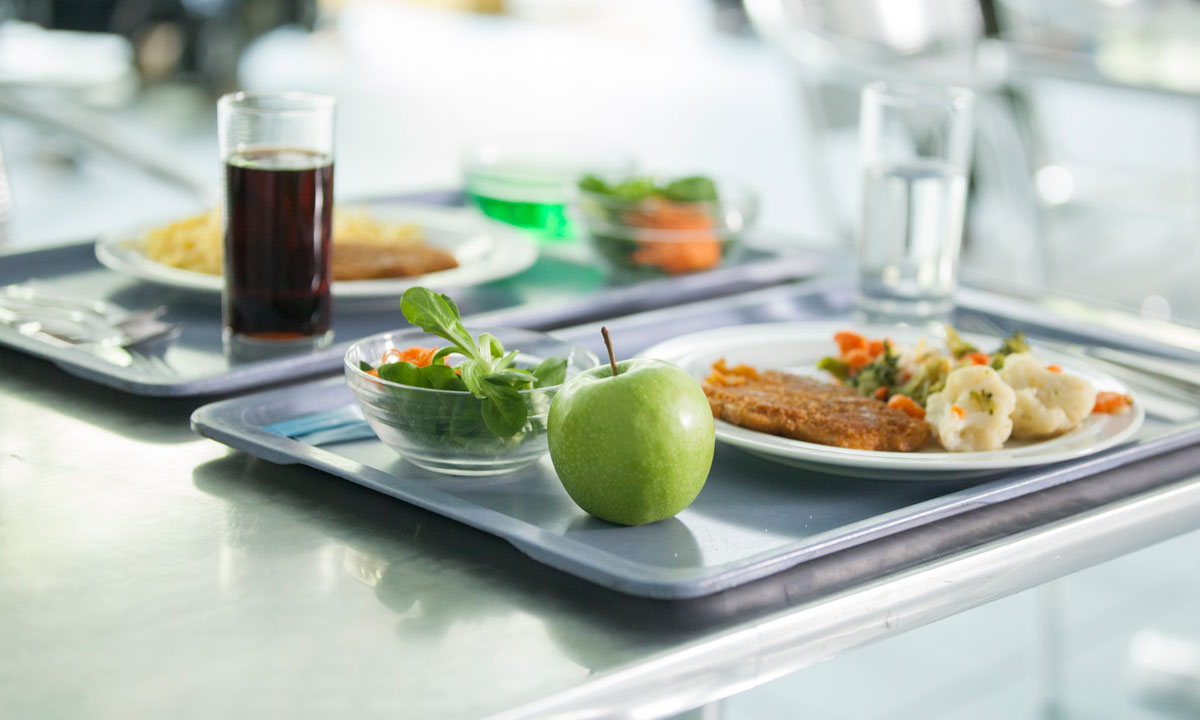Newark Coalition to Revamp School Lunches After Years of Parent Complaints
The Coalition for Healthy Food in Newark Schools will use a $3.8 million grant to implement changes.

Get stories like this delivered straight to your inbox. Sign up for The 74 Newsletter
School gardens, culturally diverse foods, and options that reflect not only dietary restrictions but also students’ preferences: These are just a few of the things the Coalition for Healthy Food in Newark Schools hopes to see in the near future.
Now, thanks to a $3.8 million grant from Novo Nordisk, a health care and pharmaceutical company, these changes might be possible.
According to a press release announcing the coalition’s launch, the program’s first year will likely include the planting of more school gardens, further funding for partnerships with local farmers, and in-school nutrition education, among many other initiatives.
The coalition will use the funding across three years with the first year serving as a baseline assessment to test the greatest needs.
Newark families have long complained about school meals, citing processed and unhealthy lunches. This is a step towards changing that.
The coalition, which officially launched on Oct. 26, is headed by the Greater Newark Conservancy, alongside partners Common Market, FoodCorps N,J., Newark Beth Israel Medical Center, R.W.J. Barnabas Health, United Way of Greater Newark, and the Urban Agriculture Cooperative.
The conservancy has worked to promote environmental, social, and racial justice in the Newark community since 1987, putting on family events centered around nutrition education, leading community garden initiatives, and between July and October, welcoming the Newark community to their expansive farm stand.
Over the course of its community work, the conservancy found that families were generally unhappy with the meals being served to children in Newark’s public schools.
In recent years, Newark’s school breakfast and lunch programs have been met with mixed reactions. While families have complained of processed, unhealthy meals, the N.J. Department of Agriculture has praised Newark’s meal services on several occasions.
In a September press release, the N.J. Department of Agriculture food and nutrition division director Rose Chamberlain said, “The Newark Public School District sets an excellent example of how a high-quality school lunch program can work.”
But in October 2021, just days before the N.J. Department of Agriculture gave similar praise to Newark’s food programs, parents complained of “horrible” lunch options for their children, most notably through an online petition.
The coalition is hopeful that some of the parents’ demands can now be met.
Between August and October of this year, the coalition surveyed a 100-person sample of community members, students, school staff, and food providers in order to assess the issues most pressing in Newark’s school cafeterias.
The survey showed that access to “from-scratch” food in students’ lunches was the most requested change. Survey respondents took issue with the frequency at which students are served heavily processed meals.
Other common complaints included a lack of meals reflecting students’ cultures, insufficient nutritional education, and inaccessibility of green space or gardens.
Natasha Dyer, executive director of the Greater Newark Conservancy, said that over the next three years, the coalition will spend about half of the Novo Nordisk funding fortifying existing programs and the other half on piloting new initiatives.
For now, Dyer said, the coalition’s work will take place in a select number of schools: Hawthorne Avenue, Avon Avenue, Mt. Vernon, Lincoln, McKinley Elementary, Thirteenth Avenue, Harriet Tubman, and Peshine Avenue.
“Luckily, our funding partner is allowing us the flexibility to adjust our plans as we go. Our goal in the first year is to assess our programming and figure out what works with the hope of leveraging policy in the district as a whole,” said Dyer.
Sarah O’Leary, the Greater Newark Conservancy’s director of youth and family education, said her personal hope is that the coalition’s work will get more students excited about health and nutrition.
O’Leary said that when children are given the opportunity to try healthy food they do not normally eat, they often discover they like it. She said that cafeteria “taste tests” of seasonal vegetables are particularly fun for students who may not have access to certain foods at home.
“For example, kids love spaghetti squash! Then they go home and tell their parents about it and that can lead to healthier meals even outside of school,” O’Leary said.
Community gardens have a similar effect, said O’Leary. Being surrounded by plants and green space, along with understanding the value of nutritious local produce, can be important for a student’s development.
“It’s exciting for kids to eat something they grew,” O’Leary said. “Getting to use tools and get their hands dirty to actually grow their own food is the best marketing for nutritious eating.”
This story was originally published in Chalkbeat. Chalkbeat is a nonprofit news site covering educational change in public schools.
Get stories like these delivered straight to your inbox. Sign up for The 74 Newsletter

;)